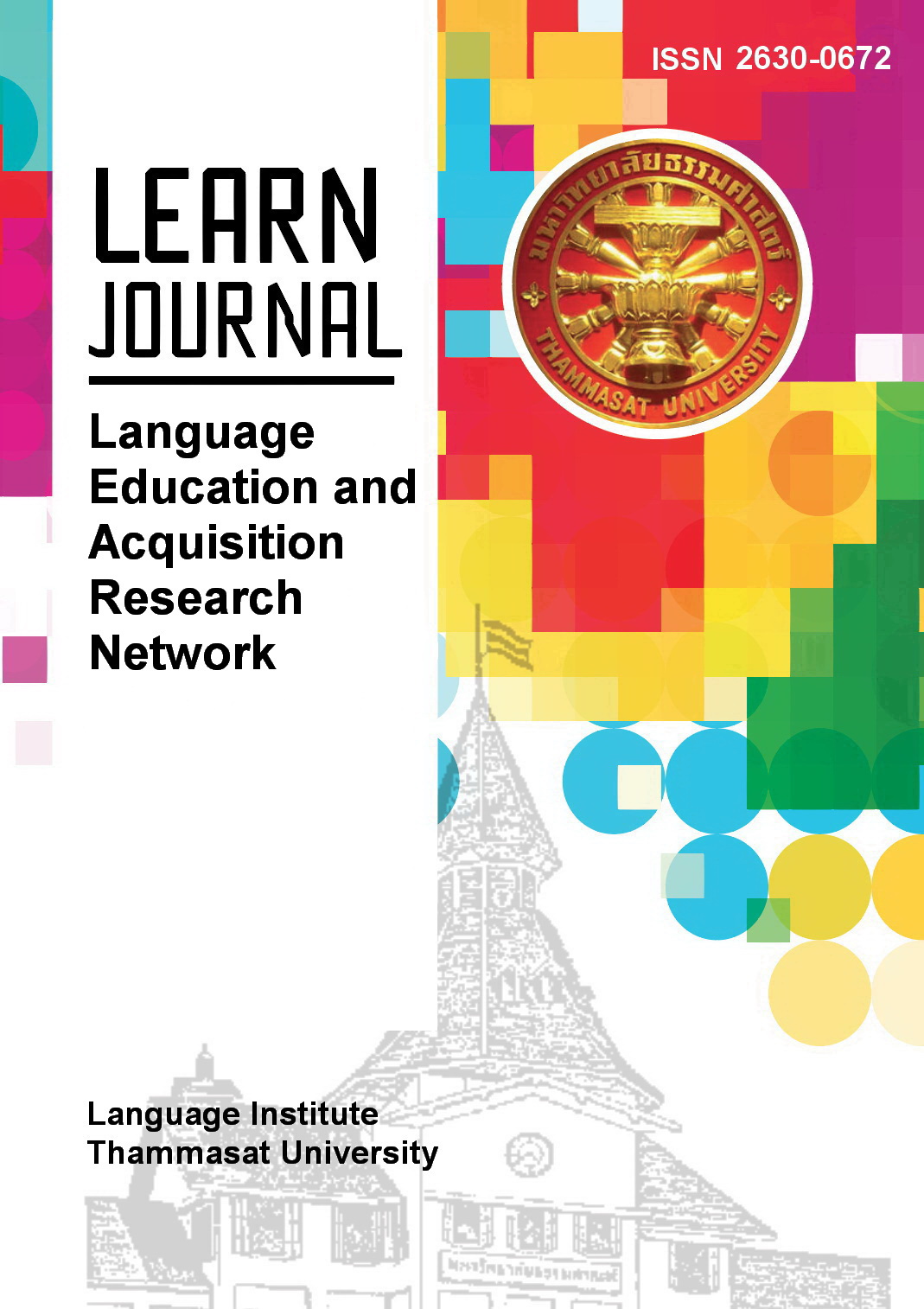Oxford’s Strategy Inventory for Language Learning: English Learning of Chinese Students in Thai University
Main Article Content
Abstract
This study aimed to explore Chinese students' application of Oxford's Strategy Inventory for Language Learning (SILL) in learning English, to investigate differences in English language learning strategies among students at different levels of English proficiency, and to report their perception of English learning through a semi-structured interview in the cross-cultural context in Thailand. The study combined quantitative data of questionnaires completed by a survey group of 244 Chinese students at a university in Thailand, and qualitative data from a semi-structured interview of 10 students from the same group. The results showed that Chinese students generally had a high level of engagement in SILL. The most frequently used strategy category was Compensation Strategies, followed by Social Strategies, Metacognitive Strategies, Cognitive Strategies, and Affective Strategies. The least frequently used strategy category was Memory Strategies. The findings revealed a significant mean difference in language learning strategies which varied significantly by English proficiency level. Participants' responses to the interview indicated that SILL was significant for their learning experience and expression in the cross-cultural context of Thailand, and that their speaking and listening skills were significantly improved. Findings of this research provided valuable inputs for further research on language learning in cross-cultural context.
Article Details
References
Ahmadi, D., & Reza, M. (2018). The use of technology in English language learning: A literature review. International Journal of Research in English Education, 3(2), 115-125.
Alharbi, A. (2017). The Social language strategies of Saudi students in an English as a second language context (Unpublished doctoral dissertation). University of RMIT, Australia.
Charoento, M. (2017). Individual learner differences and language learning strategies. Contemporary Educational Researches Journal, 7(2), 57-72.
Di Carlo, S. (2016). The use of learning strategies among learners of Spanish: An empirical study. Porta Linguarum: revista internacional de didáctica de las lenguas extranjeras, (26), 81-92.
Kunasaraphan, K. (2015). English learning strategy and proficiency level of the first year students. Procedia-Social and Behavioral Sciences, 197, 1853-1858.
Lee, C. K. (2010). An overview of language learning strategies. Annual Review of Education, Communication & Language Sciences, 7, 132-152.
Nguyen, H., & Terry, D. R. (2017). English Learning Strategies among EFL Learners: A narrative approach. IAFOR Journal of Language Learning, 3(1), 4-19.
Oxford, R. L. (1990). Language learning strategies and beyond: A look at strategies in the context of styles. Shifting the instructional focus to the learner, 35, 55.
Oxford, R. L. (1999). Relationships between second language learning strategies and language proficiency in the context of learner autonomy and self-regulation. Revista Canaria de Estudios Ingleses, 38(1), 108-26.
Oxford, R. L. (2011). Strategies for learning a second or foreign language. Language Teaching, 44(2), 167-180.
Oxford, R. L. (2016). Teaching and researching language learning strategies: Self-regulation in context. Routledge.
Oxford, R. L., & Amerstorfer, C. M. (Eds.). (2019). Language learning strategies and individual learner characteristics: Situating strategy use in diverse contexts. Bloomsbury Publishing.
Phusum, B., & Sucaromana, U. (2020). A study of English language learning strategies employed by Thai engineering students with high English learning proficiency (Unipublished Master’s thesis). Srinakharinwirot University, Thailand.
Rardprakhon, J. (2016). Language learning strategies used by Thai engineering freshmen with different English academic achievement levels (Unpublished Master’s thesis). Burapha University, Thailand.
Reinhard, K. A. R. I. N., & Gerloff, A. X. E. L. (2020). Internationalizing cooperative education: Implementing the German DHBW model in Thailand and China. Int. J. Work. Learn, 21(3), 289-301.
Rianto, A. (2020). A study of language learning strategy use among Indonesian EFL university students. Register Journal, 13(2), 231-256.
Rismayana, R. (2017). The correlation between language learning strategies and proficiency level of English Department students in Universitas Negeri Makassar (UNM). English and Literature Journal, 4(2), 37-50.
Souriyavongsa, T., Abidin, M. J. Z., Sam, R., Mei, L. L., & Aloysius, I. B. (2013). Investigating learning English strategies and English needs of undergraduate students at the National University of Laos. English Language Teaching, 6(10), 57-71.
Syafryadin, S., Martina, F., & Salniwati, S. (2020). Compensation strategies in speaking activities for non-English department students: Poor and competent speakers. JEES (Journal of English Educators Society), 5(2), 109-116.
Wang, K. H. I. (2015). The use of dialogic strategy clusters for vocabulary learning by Chinese students in the UK. System, 51, 51-64.
Yang, M., O’Sullivan, P. S., Irby, D. M., Chen, Z., Lin, C., & Lin, C. (2019). Challenges and adaptations in implementing an English-medium medical program: A case study in China. BMC medical education, 19(1), 1-8.


